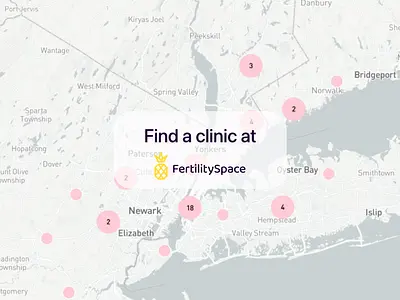Gestational surrogacy legalized in NY: How to find a clinic that has a surrogacy program

New York State has legalized compensated gestational carriers for patients undergoing IVF
Just a couple of weeks ago on February 15, 2021, the New York State statute known as the Child Parent Security Act (CPSA) became effective permitting compensated gestational surrogacy for the first time in the state's history.
In 2018, 4.7% of all embryo transfers in the United States were performed on a gestational carrier.
New York State was one of the few states where gestational surrogacy was still banned, with many IVF patients in New York having to jump through a lot of hoops in order to work remotely with a gestational carrier to build their family.
In 2018, 4.7% of all embryo transfers in the United States were performed on a gestational carrier.
New York State was one of the few states where gestational surrogacy was still banned, with many IVF patients in New York having to jump through a lot of hoops in order to work remotely with a gestational carrier to build their family.
How did IVF patients in New York do gestational surrogacy prior to legalization?
In the recent past when compensated gestational surrogacy was banned in New York State, I worked as an embryologist at a large fertility clinic in NYC.
We regularly had patients that needed to use a gestational carrier (GC) to have a child, so when we created embryos in the IVF lab for patients that intended to use a GC, the embryos were frozen and shipped to a surrogacy-friendly state.
Often times, embryos were shipped to California where paid gestational surrogacy is legal. This was done so that the embryo transfer could take place in a state that permitted this transaction and intended parents could easily be declared as the legal parents and be named on their birth certificate of the child.
This process often causes a lot of extra work for the patient to coordinate with an agency to work remotely with a gestational carrier in California and ship their precious embryos across the country to be transferred at another practice where they may not have worked with the doctor before.
Although it could be done, it added a layer of complexity and extra stress for the patient.
How does the new Child Parent Security Act affect New York IVF patients that need to use a gestational carrier?
Now that compensated gestational surrogacy is legal in New York State, embryo transfers performed on a gestational carrier can take place at the clinic in New York that the intended parents have been working with for their entire journey.
Intended parents no longer have to ship their frozen embryos from New York State to a surrogacy-friendly state so that the embryo transfer take place there instead.
Which fertility clinics in New York have a gestational carrier program?
Although this law is new, many New York fertility clinics already have in-house gestational carrier programs that can help move forward with the process a lot more seamless.
Of the 42 clinics in New York State that reported to the CDC in 2018, there were 29 clinics reported that they have a gestational carrier program.
🕵️♀️ Check out our free clinic search tool to find a clinic in NY that offers a gestational carrier program.
You don't necessarily have to use a clinic that has a gestational carrier program, as you'll likely have an agency assisting you, but this additional support could make the process easier.
Each FertilitySpace clinic profile clearly marks whether a clinic has an in-house gestational carrier program to make it easy to compare. It is listed under 'Services' if a gestational carrier program is a service the clinic offers and you can also filter your search by 'Gestational Carrier Services' to see all your options.
Choosing the right clinic for you
The IVF journey can be lengthy and working with a surrogate can make the process even longer, so it's important to make sure that you make an informed choice when choosing what clinic to work with.
Make sure to take into account clinic location, success rates, financing, and finding a doctor that's a good fit for you personally.
If you're not sure where to start when vetting a clinic, you can use our 5-step guide for how to choose a fertility clinic to figure out which factors to take into account when making your choice.
Fertility clinics are not one-size-fits-all so take the time to do some digging and find the clinic that works best for you.